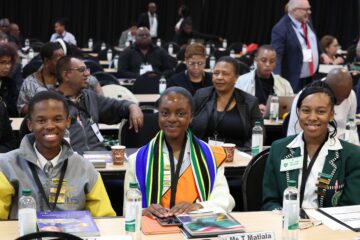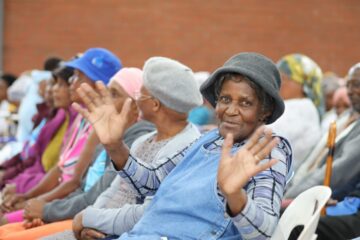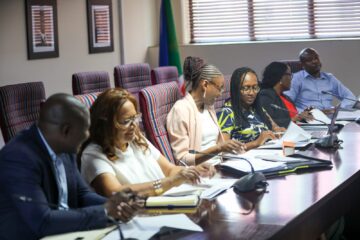TO VOTE OR NOT TO VOTE: THE YOUTH SPEAKS OUT

By Nomfundo Xulu-Lentsoane
- As South Africa’s elections on 29 May 2024 draw near, youth voices are becoming increasingly prominent, showcasing a mix of enthusiasm and scepticism towards the democratic process.
- Ophiwe Xulu and others express excitement about voting for the first time, viewing it as a crucial opportunity to influence the future of their country amidst economic and political challenges.
- In contrast, some, like Jabu Dlamini* and David Joe*, feel disillusioned with the political system, believing their votes won’t lead to meaningful change, reflecting broader concerns about corruption and inefficiency.
The cultural norm in many societies has been for children to be seen but not heard.
Over the years, however, there has been an evolution in the manner in which elders relate to their children. There seems to be more conversation with the democratic government also protecting their right to participation.
I was perplexed to hear my son and his friends, during what was meant to be a celebration of his 19th birthday, having a conversation about elections and whether they would be voting or not.
These kinds of meetings should surely revolve around the latest ‘drip’ or who has the best track on the charts. That is what I thought. Wrong. They spent hours discussing the democracy of South Africa and what role they, as teenagers, play – or should play.
As adults, we were asked to be excused because, in their view, their conversation would be somewhat controversial and not for the ears of ‘old people’. We obliged.
Ophiwe Xulu (19), as the chairperson of the private meeting of what he termed the “First-time Voters’ Association”, expressed this in his briefing notes regarding the youth’s stance:
“This is my first time voting and I believe it is my duty as a citizen. Growing up, my parents always emphasised the importance of participating in our democracy. They lived through the struggle for freedom and know first-hand how precious our right to vote is. They’ve taught me that voting is not just a right, but a responsibility.”
“Even though the political landscape can be frustrating, I know that change is impossible if we remain silent. By voting, I’m honouring the sacrifices of those who fought for this right. I’m also thinking about future generations – my vote is for a South Africa where my children can thrive. It is not just about who wins or loses, it is about being an active participant in shaping our society.”
He also expressed how he found it special that the elections are taking place 20 days after he turned 19. “The month of May marks change and growth for our country and my ballot will form part of what the country becomes.”
For Jabu Dlamini*, however, the views are different. The 18-year-old said he would not be casting his vote because he had no hope. “I’ve always believed in the power of democracy, but this year – as a first-time voter, I just can’t bring myself to vote.
“It feels like the system has let us down too many times. Politicians promise the world during their campaigns, but once they’re in office, it’s the same old corruption and inefficiency. I’ve watched my community struggle with unemployment, poor healthcare, and inadequate education. Nothing seems to change.”
“With every election, I hope for a leader who will make a difference but I’ve been disappointed too many times. Voting feels like endorsing a broken system.”
“Until I see genuine accountability and a commitment to real change from our leaders, I don’t think I can participate in what feels like a sham. Maybe not voting is my way of saying enough is enough,” he said.
Aphiwe Dlomo* is of the view that voting is not an option, it is a responsibility.
“This is my first time voting, and I’ve never been this excited. For the first time in my life, I feel like my voice matters. The past few years have been challenging for South Africa, with economic struggles and political scandals shaking our confidence. But this time, I see a candidate who genuinely seems to care about the people, who speaks about real issues like unemployment and education with a passion that feels authentic,” expressed the 18-year-old.
Relating to Jabu’s* views, David Joe* said he, too, does not believe that voting will make a change.
“As a first-time voter, I’m staying away from the polls. It is not an easy decision. In my community, political tensions are running high and expressing support for any candidate could have serious consequences. I’ve seen neighbours being harassed for their political views and I worry about my safety and that of my family.”
“While I believe in the power of voting, this year the risk feels too much. It is a painful choice but I have to prioritise our well-being. I never imagined feeling this way in a democracy but the climate of fear and intimidation is real. Not voting feels like the safest option right now, even if it means sacrificing my voice in this election,” said the 18-year-old, who will be 19 on the date of the elections.
The youth have varying views about voting on 29 May 2024. Some are nonchalant because they feel that their votes will not make any change. They say that they have been seen but not heard. Others feel that the more they advocate for their rights and are vocal about their views, the better the country will become.
The names mentioned in the story are not real to protect the identity of those spoken to.
















